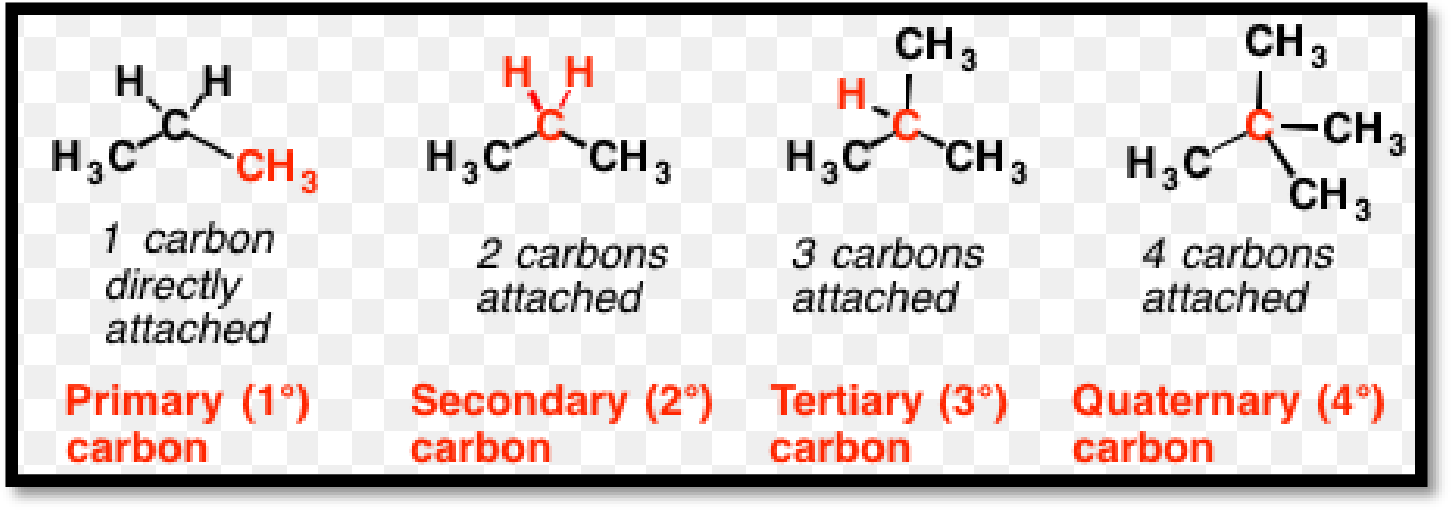
OWLv2 with MindTap Reader, 1 term (6 months) Printed Access Card for Brown/Iverson/Anslyn/Foote's Organic Chemistry, 8th Edition
8th Edition
ISBN: 9781305582439
Author: Brown, William H.; Iverson, Brent L.; Anslyn, Eric; Foote, Christopher S.
Publisher: Cengage Learning
expand_more
expand_more
format_list_bulleted
Concept explainers
Question
Chapter 2.6, Problem BQ
Interpretation Introduction
Interpretation:
Whether the carbons indicated through a, b, c and d arrows in the given structure belong to
Concept Introduction:
Depending upon the
Based on the number of carbon atoms attaced to the red coloured carbon atom in the below given figure 1, the

Figure 1
Expert Solution & Answer
Want to see the full answer?
Check out a sample textbook solution
Students have asked these similar questions
Predict the organic products that form in the reaction below:
H.
H+
+
OH
H+
Y
Note: You may assume you have an excess of either reactant if the reaction requires more than one of those molecules to form the
products.
In the drawing area below, draw the skeletal ("line") structures of the missing organic products X and Y. You may draw the
structures in any arrangement that you like, so long as they aren't touching.
Explanation
Check
Click and drag to start drawing a
structure.
G
X
C
© 2025 McGraw Hill LLC. All Rights Reserved. Terms of Use | Privacy Center | Access
+
111
Carbonyl Chem
Choosing reagants for a Wittig reaction
What would be the best choices for the missing reagents 1 and 3 in this synthesis?
1. PPh3
3
1
2
2. n-BuLi
• Draw the missing reagents in the drawing area below. You can draw them in any arrangement you like.
Do not draw the missing reagent 2. If you draw 1 correctly, we'll know what it is.
• Note: if one of your reagents needs to contain a halogen, use bromine.
Explanation
Check
Click and drag to start drawing a structure.
×
©2025 McGraw Hill LLC. All Rights Reserved. Terms of Use
A student proposes the transformation below in one step of an organic synthesis. There may be one or more reactants missing from the left-hand side, but there
are no products missing from the right-hand side. There may also be catalysts, small inorganic reagents, and other important reaction conditions missing from
the arrow.
• Is the student's transformation possible? If not, check the box under the drawing area.
. If the student's transformation is possible, then complete the reaction by adding any missing reactants to the left-hand side, and adding required catalysts,
inorganic reagents, or other important reaction conditions above and below the arrow.
• You do not need to balance the reaction, but be sure every important organic reactant or product is shown.
+
T
X
O
O
лет-ле
HO
OH
HO
OH
This transformation can't be done in one step.
Chapter 2 Solutions
OWLv2 with MindTap Reader, 1 term (6 months) Printed Access Card for Brown/Iverson/Anslyn/Foote's Organic Chemistry, 8th Edition
Ch. 2.2 - Do the line-angle formulas in each pair represent...Ch. 2.2 - Draw line-angle formulas for the three...Ch. 2.3 - Write IUPAC names for these alkanes.Ch. 2.4 - Combine the proper prefix, infix, and suffix and...Ch. 2.4 - Write the molecular formula, IUPAC name, and...Ch. 2.4 - Write molecular formulas for each bicycloalkane,...Ch. 2.4 - Prob. 2.7PCh. 2.5 - For 1,2-dichloroethane: (a) Draw Newman...Ch. 2.5 - Following is a chair conformation of cyclohexane...Ch. 2.5 - Draw the alternative chair conformation for the...
Ch. 2.5 - Draw a chair conformation of...Ch. 2.6 - Which cycloalkanes show cis, trans isomerism? For...Ch. 2.6 - Following is a planar hexagon representation for...Ch. 2.6 - Here is one cis,trans isomer of...Ch. 2.6 - Prob. AQCh. 2.6 - Prob. BQCh. 2.6 - Prob. CQCh. 2.7 - Arrange the alkanes in each set in order of...Ch. 2 - Write a line-angle formula for each condensed...Ch. 2 - Write the molecular formula of each alkane.Ch. 2 - Using parentheses and subscripts, provide an even...Ch. 2 - Which statements are true about constitutional...Ch. 2 - Prob. 2.20PCh. 2 - Each member of the following set of compounds is...Ch. 2 - Each of the following compounds is an amine...Ch. 2 - Each of the following compounds is either an...Ch. 2 - Draw structural formulas and write IUPAC names for...Ch. 2 - Draw structural formulas for all of the following....Ch. 2 - Write IUPAC names for these alkanes and...Ch. 2 - Write structural formulas and line-angle formulas...Ch. 2 - Explain why each is an incorrect IUPAC name and...Ch. 2 - For each IUPAC name, draw the corresponding...Ch. 2 - Write the IUPAC name for each compound.Ch. 2 - Prob. 2.31PCh. 2 - Torsional strain resulting from eclipsed CH bonds...Ch. 2 - How many different staggered conformations are...Ch. 2 - Consider 1-bromopropane, CH3CH2CH2Br. (a) Draw a...Ch. 2 - Consider 1-bromo-2-methylpropane and draw the...Ch. 2 - trans-1,4-Di-tert-butylcyclohexane exists in a...Ch. 2 - From studies of the dipole moment of...Ch. 2 - Prob. 2.38PCh. 2 - Following are the alternative chair conformations...Ch. 2 - Prob. 2.40PCh. 2 - Prob. 2.41PCh. 2 - Draw line-angle formulas for the cis and trans...Ch. 2 - Name and draw structural formulas for all...Ch. 2 - Using a planar pentagon representation for the...Ch. 2 - Gibbs free energy differences between...Ch. 2 - Prob. 2.46PCh. 2 - Calculate the difference in Gibbs free energy in...Ch. 2 - Draw the alternative chair conformations for the...Ch. 2 - Use your answers from Problem 2.48 to complete the...Ch. 2 - There are four cis,trans isomers of...Ch. 2 - Draw alternative chair conformations for each...Ch. 2 - 1,2,3,4,5,6-Hexachlorocyclohexane shows cis,trans...Ch. 2 - Prob. 2.53PCh. 2 - What generalization can you make about the...Ch. 2 - What unbranched alkane has about the same boiling...Ch. 2 - Complete and balance the following combustion...Ch. 2 - Following are heats of combustion per mole for...Ch. 2 - Following are structural formulas and heats of...Ch. 2 - Without consulting tables, arrange these compounds...Ch. 2 - Which would you predict to have the larger (more...Ch. 2 - Following are structural formulas for 1,4-dioxane...Ch. 2 - Following is a planar hexagon representation of...Ch. 2 - On the left is a stereorepresentation of glucose...Ch. 2 - Prob. 2.64PCh. 2 - Prob. 2.65P
Knowledge Booster
Learn more about
Need a deep-dive on the concept behind this application? Look no further. Learn more about this topic, chemistry and related others by exploring similar questions and additional content below.Similar questions
- Determine the structures of the missing organic molecules in the following reaction: X+H₂O H* H+ Y OH OH Note: Molecules that share the same letter have the exact same structure. In the drawing area below, draw the skeletal ("line") structures of the missing organic molecules X and Y. You may draw the structures in any arrangement that you like, so long as they aren't touching. Click and drag to start drawing a structure. X Sarrow_forwardPredict the major products of this organic reaction. If there aren't any products, because nothing will happen, check the box under the drawing area instead. No reaction. HO. O :☐ + G Na O.H Click and drag to start drawing a structure. XS xs H₂Oarrow_forwardWhat are the angles a and b in the actual molecule of which this is a Lewis structure? H H C H- a -H b H Note for advanced students: give the ideal angles, and don't worry about small differences from the ideal groups may have slightly different sizes. a = b = 0 °arrow_forward
- What are the angles a and b in the actual molecule of which this is a Lewis structure? :0: HCOH a Note for advanced students: give the ideal angles, and don't worry about small differences from the ideal that might be caused by the fact that different electron groups may have slightly different sizes. a = 0 b=0° Sarrow_forwardDetermine the structures of the missing organic molecules in the following reaction: + H₂O +H OH O OH +H OH X Note: Molecules that share the same letter have the exact same structure. In the drawing area below, draw the skeletal ("line") structure of the missing organic molecule X. Click and drag to start drawing a structure.arrow_forwardIdentify the missing organic reactant in the following reaction: x + x O OH H* + ☑- X H+ O O Х Note: This chemical equation only focuses on the important organic molecules in the reaction. Additional inorganic or small-molecule reactants or products (like H₂O) are not shown. In the drawing area below, draw the skeletal ("line") structure of the missing organic reactant X. Click and drag to start drawing a structure. Carrow_forward
- CH3O OH OH O hemiacetal O acetal O neither O 0 O hemiacetal acetal neither OH hemiacetal O acetal O neither CH2 O-CH2-CH3 CH3-C-OH O hemiacetal O acetal CH3-CH2-CH2-0-c-O-CH2-CH2-CH3 O neither HO-CH2 ? 000 Ar Barrow_forwardWhat would be the best choices for the missing reagents 1 and 3 in this synthesis? 1. PPh3 2 2. n-BuLi 3 Draw the missing reagents in the drawing area below. You can draw them in any arrangement you like. • Do not draw the missing reagent 2. If you draw 1 correctly, we'll know what it is. • Note: if one of your reagents needs to contain a halogen, use bromine. Explanation Check Click and drag to start drawing a structure.arrow_forwardPredict the products of this organic reaction: NaBH3CN + NH2 ? H+ Click and drag to start drawing a structure. ×arrow_forward
- Predict the organic products that form in the reaction below: + OH +H H+ ➤ ☑ X - Y Note: You may assume you have an excess of either reactant if the reaction requires more than one of those molecules to form the products. In the drawing area below, draw the skeletal ("line") structures of the missing organic products X and Y. You may draw the structures in any arrangement that you like, so long as they aren't touching. Click and drag to start drawing a structure. Garrow_forwardPredict the organic products that form in the reaction below: OH H+ H+ + ☑ Y Note: You may assume you have an excess of either reactant if the reaction requires more than one of those molecules to form the products. In the drawing area below, draw the skeletal ("line") structures of the missing organic products X and Y. You may draw the structures in any arrangement that you like, so long as they aren't touching. Click and drag to start drawing a structure. ✓ marrow_forwardDetermine the structures of the missing organic molecules in the following reaction: + H₂O +H H+ Y Z ☑ ☑ Note: Molecules that share the same letter have the exact same structure. In the drawing area below, draw the skeletal ("line") structures of the missing organic molecules X, Y, and Z. You may draw the structures in any arrangement that you like, so long as they aren't touching. Molecule X shows up in multiple steps, but you only have to draw its structure once. Click and drag to start drawing a structure. AP +arrow_forward
arrow_back_ios
SEE MORE QUESTIONS
arrow_forward_ios
Recommended textbooks for you
 Organic ChemistryChemistryISBN:9781305580350Author:William H. Brown, Brent L. Iverson, Eric Anslyn, Christopher S. FootePublisher:Cengage Learning
Organic ChemistryChemistryISBN:9781305580350Author:William H. Brown, Brent L. Iverson, Eric Anslyn, Christopher S. FootePublisher:Cengage Learning Organic Chemistry: A Guided InquiryChemistryISBN:9780618974122Author:Andrei StraumanisPublisher:Cengage Learning
Organic Chemistry: A Guided InquiryChemistryISBN:9780618974122Author:Andrei StraumanisPublisher:Cengage Learning
 Macroscale and Microscale Organic ExperimentsChemistryISBN:9781305577190Author:Kenneth L. Williamson, Katherine M. MastersPublisher:Brooks Cole
Macroscale and Microscale Organic ExperimentsChemistryISBN:9781305577190Author:Kenneth L. Williamson, Katherine M. MastersPublisher:Brooks Cole

Organic Chemistry
Chemistry
ISBN:9781305580350
Author:William H. Brown, Brent L. Iverson, Eric Anslyn, Christopher S. Foote
Publisher:Cengage Learning

Organic Chemistry: A Guided Inquiry
Chemistry
ISBN:9780618974122
Author:Andrei Straumanis
Publisher:Cengage Learning


Macroscale and Microscale Organic Experiments
Chemistry
ISBN:9781305577190
Author:Kenneth L. Williamson, Katherine M. Masters
Publisher:Brooks Cole